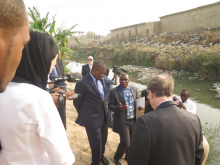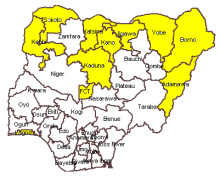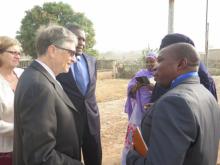Bill Gates applauds WHO for establishing environmental surveillance in Nigeria
Kaduna, Nigeria 22 January 2016 - The Co-Chair of Bill & Melinda Gates Foundation, Mr Bill Gates has applauded the World Health Organization for the support to the Nigeria Government in establishing environmental surveillance and building sustainable institutional capacity needed to ensure that there is no undetected circulation of the wild polio virus (WPV).
The gold standard for polio surveillance in the Global Polio Eradication Initiative Programme is Acute Flaccid Paralysis (AFP) surveillance. This involves identifying all cases of AFP, collecting stool specimens from those cases and testing the specimens in a WHO accredited laboratory to see if they contain polio virus.
Environmental surveillance is complimentary to AFP surveillance as it can also detect circulating wild and/or vaccine-derived polio viruses in the population.
Standing on a vantage point over the rickety Rigassa Bridge in Igabi local government area (LGA) of Kaduna on 20 January, 2015, Mr Gates appreciated the perils associated with environmental surveillance, especially sample collection and transportation but underscored the importance of the process.
WHO formally removed Nigeria from the list of polio-endemic countries on 24 September, 2015 but the country needs to maintain zero polio case status in order to attain certification in 2017.
Dr Audu Musa Idowu, the WHO State Coordinator (SC) Kaduna, had earlier explained to Mr Gates and members of his entourage, the contribution of environmental surveillance in Kaduna which provided an opportunity for strengthening surveillance and institution of special interventions like the utilization of IPV in Zaria and Sabon Gari LGAs during immunization campaigns, which further informed the inclusion of the state in the first phase of the national IPV introduction into routine immunization schedule.
He also explained the rationale for initiating environmental surveillance in the state, noting that the choice of the site was centered on concerns about security threats to health workers which often affected service delivery coupled with burgeoning population and immunity gaps which can be sanctuaries for the polio virus.
The SC further stated that prior to the WHO-supported special intervention on youth engagement in May 2014, Rigassa community, where the environmental site is located, had perennial noncompliance to polio vaccination and was at the center of a geographical axis that had the highest WPV transmission.
There are presently five environmental sites in the three very high risk LGAs of Zaria, Sabon Gari and Igabi of Kaduna. It could be recalled that Kaduna state recorded the last WPV case detected from environmental samples in Nigeria in 2014.
Environmental surveillance was initiated in Nigeria in 2011 in Kano with three sample collection sites but presently, the country is implementing environmental surveillance in 23 LGAs in 10 states and the Federal Capital Territory with a total number of 38 sample collection sites.
Mr Gates was accompanied on the visit by Alhaji Aliko Dangote, Officials of the Kaduna State Ministry of Health and principal staff of BMGF.
________________________________________
For more information, please contact:
Technical contacts:
Dr Fiona Braka; Tel: +234 703 170 5252; Email: brakaf [at] who.int
Dr Audu Idowu; Tel: +234 703 170 5252; Email: musaau@ [at] who.int
Media contact:
Ms Charity Warigon; Tel: +234 810 221 0093; Email: warigonc [at] who.int
________________________________________
Below:
01. Dr Idowu (right) explaining the rationale for environmental surveillance to Mr Gates while Alhaji Dangote listened
02. The WHO SC conducting Mr Gates and his entourage round the site
03. Map of Nigeria showing states with established environmental surveillance sites






